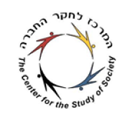Duration of Research: 2001-2006
Funding Agency: German-Israeli Project Cooperation (DIP) - On behalf of the German Federal Ministry of Education and Research.
Researchers:
Gideon Fishman (P.I.)
Zvi Eisikovits (P.I.)
Gustavo S. Mesch (P.I.)
Hagit Turjeman (Research Coordinator)
Vicki Brat - (Research Assistant)
Olga Agour - (Research Assistant)
Orly Ross - (Research Assistant)
Collaborators and partners: Prof. Rainer Silbereisen and his team from the University of Jena, Germany.
Project description:
The purpose of the study has been to study the adjustment and mal-adjustment of immigrant adolescents from the Former Soviet Union (FSU). In particular the study focused on the issue of delinquency and well being as possible outcomes of the immigration process. The longitudinal design aimed at looking at time in the host country as a factor that might affect the acculturation process of the adolescents.
Within the study other important variables were focused on such as changes in social identity, the impact of relations with the family, the family structure and its functioning as a control agent, association with delinquent peers, school performance and subjective feelings of alienation and discrimination.
The study population in the Israeli study was selected from towns where there was a large concentration of immigrants and it was identified in out of school setting and through investigating informants in the neighborhood as to adolescents who answer to the criteria set for inclusion in the sample. Over 1400 adolescents were selected and a face to face interview that lasted about an hour was conducted in the Russian language by trained interviewers. In addition an in depth interview was conducted with 40 respondents and these interviews were qualitatively analyzed.
This study in addition to being longitudinal, it also was a panel study where the same respondents were contacted 3 times with one year intervals so that the effect of time could be examined as well. The last wave left us with about 55% of the original sample which is an expected rate of attrition in such a study.
Once the adolescents were interviewed for the third time, their family were contacted and additional information was obtained, some of it added to our understanding of the immigration process, and some information helped to verify and validate the information gathered from the interviews with the adolescents. That was done in the third and fourth year of the study. An additional round of interviews was conducted in the fifth year with the families in order to check on the adjustment of the parents and with the intention to elaborate on the information the adolescents supplied by adding more family background information.
In order to read the report of the first wave (In Hebrew only), please enter the link
Publications:
Mesch, GS., Turjeman, H., Fishman G. (2008) . "Social Identity and violence among immigrant adolescents" New Directions for Youth Development. (119):129-50.
Turjeman H.; Mesch GS.; Fishman G., (2008). "Social identity, identity change and delinquent behavior" International Journal of Comparative Sociology. 49:111-126.
Turjeman, H., Fishman G., Mesch GS., (2008) "The effect of acculturation on depressive moods: Immigrant boys and girls during their transition from late adolescence to early adulthood". International Journal of Psychology. 43(1): 32-44.
Mesch, GS., Turjeman, H., Fishman, G. (2007). "Percieved discrimination and well being of immigrant adolescents". Journal of Youth and Adolescents. 37: 592-604.
Fishman G. & Mesch GS., (2005), "Acculturation and Delinquency among Adolescent Immigrants from the FSU". Journal of Conflict and Violence Research. 7(2):14-40.

